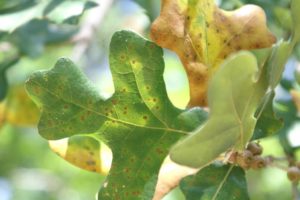
COMMON NAME: Tubakia/Actinopelte leaf spot
SCIENTIFIC NAME: Actinopelte dryina
DISEASE DESCRIPTION
This leaf spot is a common problem on oak trees. In some areas, the defoliation caused by the fungus can be serious and lead to health issues.
SYMPTOMS:
The symptoms will develop later, during the warmer summer, as necrotic circular leaf spots. Dark to reddish brown in color, usually surrounded by a chlorotic (yellowing) halo.
In cases of a severe infection leaves can prematurely defoliate. The pathogen can spread to the leaf veins, and death of the veins leads to collapse of leaf tissue. Small twig cankers may also form. However, in most cases it will not defoliate, or completely kill the oak.
BIOLOGY:
Affects many species of oak, however, red oaks are the most prevalent. The fungus can overwinter in the affected twigs and foliage, and the spores are disseminated to other trees under favorable conditions of wind and moist environments in the early spring as the leaves emerge. Actinopelte also has a serious impact on trees that are under stress, such as iron chlorosis.
MANAGEMENT METHODS:
To minimize the spread of the disease: destroy infected leaves. Air movement can help minimize incidences of the fungus by removal of some branches. An increase in fertilization should be necessary in trees that are severely defoliated, to stimulate growth. Chemical treatment as sprays is available as preventive measure, however they are not warranted.
RESOURCE LINKS*:
https://plantclinic.tamu.edu/factsheets/tubakia-actinopelte-leaf-spot/. Texas A&M AgriLife Extension. Texas Plant Disease Diagnostic Lab, 2002.
https://plantclinic.tamu.edu/2013/09/27/actinopelte-leaf-spot/. Texas A&M AgriLife Extension. Texas Plant Disease Diagnostic Lab, 2017.
This factsheet is authored by Barbara Rodrigues (PhD student)
Factsheet information for the plant health issues represented by the images on the 2019 TPDDL calendar were written by graduate students enrolled in the Department of Plant Pathology & Microbiology PLPA601 Introductory Plant Pathology course in the 2018 Fall semester (course instructor: Dr. David Appel). This exercise provides an opportunity for a high impact learning activity where the students are tasked with producing an informational output directed to the general public and to provide opportunity for the students to write.